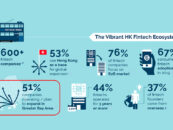4 Out of 5 of Customers Don’t Think Banks Know What They Need
by Fintech News Hong Kong March 4, 2019According to a study conducted by JD Power, 54% of customers don’t fully trust their primary banks, which the study marks as notable sinceconsumers often consider banks their trusted adviser for financial planning.
The study finds that four in five (83%) customers say their bank representatives do not spend enough time identifying their specific needs before offering products and services. The cause and effect here seems apparent, as level of trust is at 69% for those whose needs were identified, in contrast with the 43% for those who do not experience the same.
Furthermore, with hyper-personalisation as a big factor in today’s financial services, of those customers whose marketing communication is personalised, 64% trust their bank, compared to 43% who do when communication is not personalised.
Communication with Customers is Key to Building Trust
To make matters worse, at least four in five customers do not fully understand the features and benefits associated with their main account (80%) and their primary bank’s fee structures (81%).
The confusion extends into mobile banking as well. Although mobile app usage has grown by 13% (43% in 2019 vs. 30% in 2018), two-thirds of customers (65%) still do not completely understand which mobile banking products, services, or features are available to them.
According to Anthony Chiam, Regional Practice Leader, Global Business Intelligence – Asia & Australia at J.D Power:
“Banking is fundamentally an industry of trust and when customers trust their banks, they are also more receptive to financial advice and less likely to switch from their primary bank to other providers, particularly virtual banks. ”
“When banks consistently fulfil their service promise, trust will be earned over time. This trust often becomes embedded in a customer’s relationship with the bank and influences future financial decisions and planning.”
As trust is a key driver of loyalty and advocacy, over one-third of customers (36%) who do not completely trust their bank say that they will likely switch provider. With digital channels becoming more prevalent, the strength of these channels is also instrumental in building customers’ trust in banks. Of customers who are satisfied with their bank’s digital channels, 72% trust their bank. In comparison, only 21% trust their bank when they are not satisfied with their bank’s digital channels.
When customers trust their primary bank, they are generally more satisfied , compared with those who do not — showing the long-term impact of cultivating trust.
Despite these issues, the study names Citibank as the highest-ranking bank in consumer satisfaction, two years in a row now. Citibank achieves the highest score in four of the six study factors: product offerings; account information; account activities; and fees. DBS ranks second with 714 points and Bank of East Asia ranks third with 694 points.
Image Credit: JD Power








